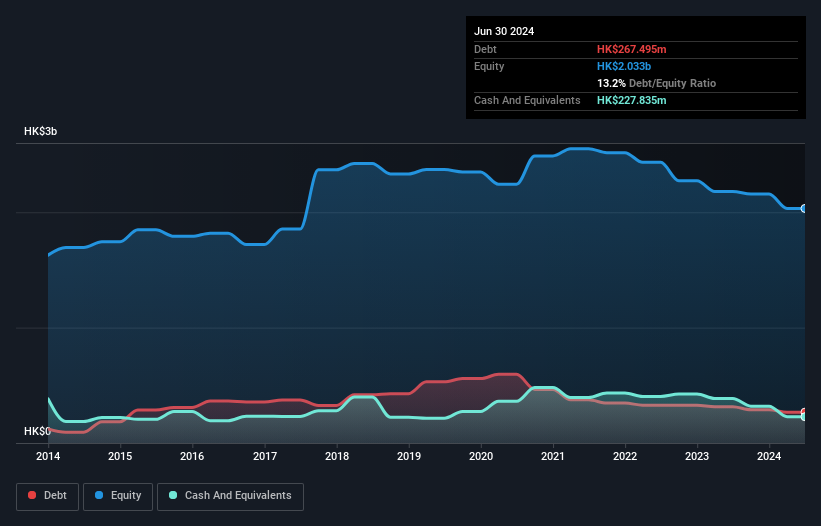Health Check: How Prudently Does Embry Holdings (HKG:1388) Use Debt?
Warren Buffett famously said, 'Volatility is far from synonymous with risk.' So it seems the smart money knows that debt - which is usually involved in bankruptcies - is a very important factor, when you assess how risky a company is. We note that Embry Holdings Limited (HKG:1388) does have debt on its balance sheet. But is this debt a concern to shareholders?
Why Does Debt Bring Risk?
Debt and other liabilities become risky for a business when it cannot easily fulfill those obligations, either with free cash flow or by raising capital at an attractive price. Part and parcel of capitalism is the process of 'creative destruction' where failed businesses are mercilessly liquidated by their bankers. While that is not too common, we often do see indebted companies permanently diluting shareholders because lenders force them to raise capital at a distressed price. Of course, debt can be an important tool in businesses, particularly capital heavy businesses. When we think about a company's use of debt, we first look at cash and debt together.
Check out our latest analysis for Embry Holdings
How Much Debt Does Embry Holdings Carry?
You can click the graphic below for the historical numbers, but it shows that Embry Holdings had HK$267.5m of debt in June 2024, down from HK$314.5m, one year before. However, it also had HK$227.8m in cash, and so its net debt is HK$39.7m.

A Look At Embry Holdings' Liabilities
According to the last reported balance sheet, Embry Holdings had liabilities of HK$364.9m due within 12 months, and liabilities of HK$286.9m due beyond 12 months. Offsetting this, it had HK$227.8m in cash and HK$54.0m in receivables that were due within 12 months. So its liabilities total HK$370.0m more than the combination of its cash and short-term receivables.
This deficit casts a shadow over the HK$143.6m company, like a colossus towering over mere mortals. So we'd watch its balance sheet closely, without a doubt. After all, Embry Holdings would likely require a major re-capitalisation if it had to pay its creditors today. When analysing debt levels, the balance sheet is the obvious place to start. But it is Embry Holdings's earnings that will influence how the balance sheet holds up in the future. So when considering debt, it's definitely worth looking at the earnings trend. Click here for an interactive snapshot.
In the last year Embry Holdings had a loss before interest and tax, and actually shrunk its revenue by 7.5%, to HK$1.2b. That's not what we would hope to see.
Caveat Emptor
Over the last twelve months Embry Holdings produced an earnings before interest and tax (EBIT) loss. Indeed, it lost a very considerable HK$127m at the EBIT level. Combining this information with the significant liabilities we already touched on makes us very hesitant about this stock, to say the least. Of course, it may be able to improve its situation with a bit of luck and good execution. But we think that is unlikely, given it is low on liquid assets, and burned through HK$56m in the last year. So we consider this a high risk stock and we wouldn't be at all surprised if the company asks shareholders for money before long. There's no doubt that we learn most about debt from the balance sheet. However, not all investment risk resides within the balance sheet - far from it. For example, we've discovered 2 warning signs for Embry Holdings (1 is potentially serious!) that you should be aware of before investing here.
Of course, if you're the type of investor who prefers buying stocks without the burden of debt, then don't hesitate to discover our exclusive list of net cash growth stocks, today.
Valuation is complex, but we're here to simplify it.
Discover if Embry Holdings might be undervalued or overvalued with our detailed analysis, featuring fair value estimates, potential risks, dividends, insider trades, and its financial condition.
Access Free AnalysisHave feedback on this article? Concerned about the content? Get in touch with us directly. Alternatively, email editorial-team (at) simplywallst.com.
This article by Simply Wall St is general in nature. We provide commentary based on historical data and analyst forecasts only using an unbiased methodology and our articles are not intended to be financial advice. It does not constitute a recommendation to buy or sell any stock, and does not take account of your objectives, or your financial situation. We aim to bring you long-term focused analysis driven by fundamental data. Note that our analysis may not factor in the latest price-sensitive company announcements or qualitative material. Simply Wall St has no position in any stocks mentioned.
About SEHK:1388
Embry Holdings
An investment holding company, designs, researches, develops, manufactures, trades in, and sells ladies brassieres, panties, swimwear, sleepwear, and others.
Adequate balance sheet and slightly overvalued.
Market Insights
Community Narratives



